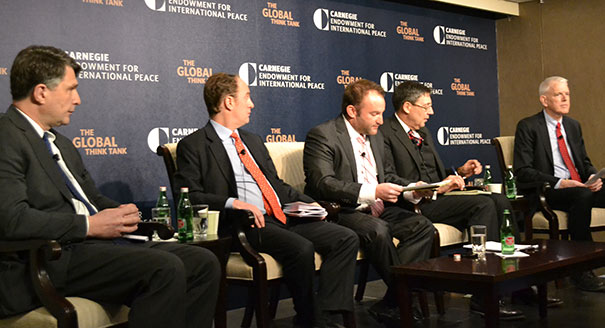Registration
You will receive an email confirming your registration.
A fierce debate is underway in Washington over whether to provide arms to Ukraine in its fight against Russian-supported rebels. Despite last week’s ceasefire agreement reached after talks between Vladimir Putin, Petro Poroshenko, Angela Merkel, and François Hollande, many remain skeptical about prospects for its effective and sustained implementation.
The Carnegie Endowment for International Peace brought together leading thinkers on both sides of this issue to examine the risks and benefits of sending arms to Ukraine. The debate was moderated by NPR’s David Greene.
John E. Herbst
John E. Herbst is director of the Dinu Patriciu Eurasia Center at the Atlantic Council. He is a former U.S. ambassador to Ukraine and is co-author of Preserving Ukraine’s Independence, Resisting Russian Aggression.
Steven Pifer
Steven Pifer is director of the Arms Control and Non-Proliferation Initiative and a senior fellow in the Foreign Policy program at the Brookings Institution. He is a former U.S. ambassador to Ukraine and is co-author of Preserving Ukraine’s Independence, Resisting Russian Aggression.
Eugene Rumer
Eugene Rumer is a senior associate and the director of Carnegie’s Russia and Eurasia Program. He is a former national intelligence officer for Russia and Eurasia at the U.S. National Intelligence Council and is co-author of Arm Ukraine and You Risk Another Black Hawk Down and of Conflict in Ukraine (MIT Press, 2015).
Jeremy Shapiro
Jeremy Shapiro is a fellow with the Project on International Order and Strategy and the Center on the United States and Europe in the Foreign Policy program at the Brookings Institution. He previously served as a member of the secretary’s policy planning staff at the State Department and senior adviser to Assistant Secretary of State for European and Eurasian Affairs Philip Gordon.
David Greene
David Greene is host of NPR’s Morning Edition. He was previously an NPR foreign correspondent based in Moscow.
